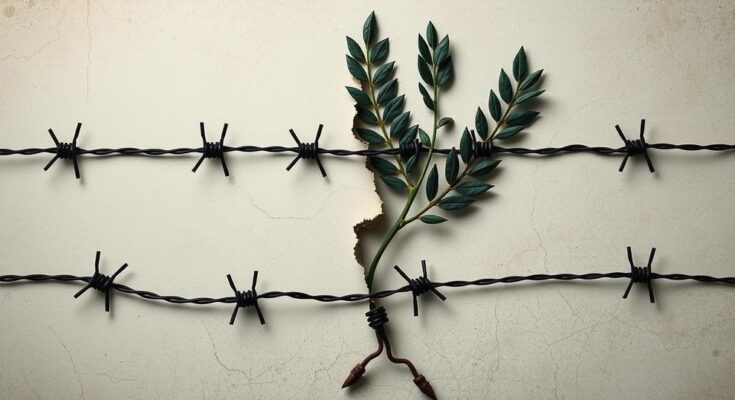The M23 rebel group, reportedly backed by Rwanda, has seized control of Goma in the Democratic Republic of Congo, leading to protests and unrest in Kinshasa. UN experts have provided evidence of Rwandan military involvement, complicating the security situation as the fighting escalates. Kagame’s government perceives threats from Hutu militias linked to the Rwandan genocide, prompting military actions. International mediation efforts are underway, but the conflict remains deeply rooted in historical tensions and resource control.
Protests in Kinshasa, the capital of the Democratic Republic of Congo, have erupted against Rwandan President Paul Kagame, with demonstrators burning his portraits and Rwandan flags. This unrest coincides with the M23 rebel group’s seizure of much of Goma, raising allegations of Rwandan military backing—claims substantiated by UN reports that assert the Rwandan army exercises “de facto control” over M23 operations.
Goma, situated near Lake Kivu and rich in minerals, has transformed into a critical humanitarian hub amid escalating violence between M23 forces and Congolese troops since late 2021. The continued conflict has compelled many civilians to flee, with Goma’s population ballooning to around two million. Recent clashes have resulted in widespread chaos, including reported fatalities, as communication lines remain cut.
UN peacekeeping chief Jean-Pierre Lacroix confirmed the presence of Rwandan troops in Goma, although assessing their exact numbers proved challenging. In an acknowledgment of the situation, some Congolese soldiers reportedly crossed into Rwanda after surrendering, highlighting the extent of the crisis.
Despite Kagame’s consistent denial of allegations regarding support for M23, Richard Moncrief from the International Crisis Group noted a shift in Rwanda’s tone, evolving from denial to attempting to justify military responses citing security concerns. Rwanda’s foreign ministry has reiterated its concern over the conflict near its borders, labeling critical statements as “misguided” or “manipulative.”
Kagame’s perspective on the conflict is heavily influenced by the Rwandan genocide of 1994 and the subsequent rise of the Democratic Forces for the Liberation of Rwanda (FDLR) in DR Congo, composed of Hutu militants involved in the genocide. Kagame perceives the FDLR as a persistent threat, prompting past military interventions against them.
The recent resurgence of M23 is seen as not merely a strategic endeavor but also a political maneuver by Kagame to consolidate influence in North Kivu province. Moncrief suggests M23’s actions may reflect a desire to signify power rather than a pressing need for territorial gains, given their control over other economically significant areas.
The M23’s formation is intertwined with long-standing tensions related to the Tutsi community’s interests in eastern DR Congo, with origins tracing back to a previous insurgency that ceased following a peace agreement. However, their resurgence in 2021 raises questions about Rwanda’s ongoing involvement and support for the group.
Evidence indicates that the M23 has benefitted from extensive training and logistical support from the Rwandan military, markedly seen in their use of advanced weaponry not available to other armed groups in the region. This includes specialized training in military tactics, with oversight from Rwandan officers, further complicating the dynamics of the conflict.
In addition to Rwanda, Uganda has been implicated in supporting M23, further muddling the already complex political landscape. The UN reports detail systematic recruitment and military collaboration between these forces, while Kagame expressed dissatisfaction with the Congolese government’s handling of the FDLR.
Recent developments highlight M23’s strategic blockade of key towns to control lucrative resources, leveraging territorial gains to enhance their financial operations, notably in coltan trade. This robust economic interest has positioned them favorably, allowing substantial revenues that circulate directly back into Rwanda.
Geolocated intelligence reports observed Rwandan troop movements near Goma, suggesting ongoing coordination between Rwandan forces and M23 fighters. The evidence points to advanced military capabilities, including weaponry utilization that is beyond the resources of other rebel factions in the area.
Kagame has publicly dismissed UN findings as misrepresentations while contending that the sole topic for discussions regarding DR Congo should be the FDLR and the threats they pose. The East African Community has attempted to mediate peace in the region, but ongoing tensions signal a protracted struggle ahead.
The situation in the eastern Democratic Republic of Congo, particularly in Goma, has deteriorated as M23 rebels, reportedly backed by Rwanda, have gained control over significant territories. The historical context is crucial, rooted in the Rwandan genocide and the subsequent flight of Hutu militias into Congo, which still influences the current political and military landscape. Kagame’s government perceives the ongoing conflict as a manifestation of longstanding grievances and threats from these rebel groups, complicating efforts for stabilization and peace in the region.
The unfolding events in Goma highlight the complex interplay of local, regional, and international dynamics surrounding the M23 insurgency. With substantial evidence suggesting Rwandan military support for M23, the situation requires urgent attention to prevent further escalation. Additionally, addressing the historical grievances stemming from the Rwandan genocide remains crucial for lasting peace and security in the region, which continually affects relations between DR Congo and its neighbors, particularly Rwanda.
Original Source: www.bbc.com




